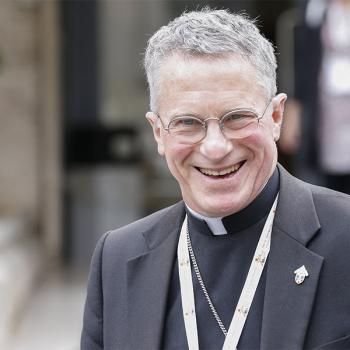The Three Amigos' experience is emblematic of a larger reality in the U.S. today, says Haim Beliak, a Reform rabbi who is a member of several interfaith associations and a board member for the Progressive Jewish Alliance in the Los Angeles area. Because Christians and Jews in particular have been in conversation now for many decades, a level of trust has been built. Serious conversations about Israel and Palestine can take place between them because they have a history that is distinct from the tradition of Christian anti-Semitism. The challenge now is to include Muslims in such discussions and thereby resist what Beliak sees as a tendency in some quarters for Jews and Christians to pit themselves against Muslims by emphasizing a "Judeo-Christian" tradition. "When I hear that phrase," Beliak says, "I feel as if I were being speared by the hyphen."
Recently, Mackenzie, Falcon and Rahman reflected on who was showing up at interfaith events and who wasn't. They acknowledged that it is often easier to communicate across the lines of faith than to communicate with members of their own traditions who are suspicious of interfaith work. Falcon is ordained in the Reform tradition, but his synagogue is unaffiliated; he invented the term "meditative Reform" to describe the kind of Judaism he practices. Rahman designates himself a Sufi teacher, which places him to a certain degree outside conventional Muslim structures -- though those structures are comparatively loose.
On the Christian side, the three acknowledged that they have their own biases against conservative Christians, whom they tend to see as narrow-minded and prejudiced against Muslims. In response, the Amigos decided to attend together a service at Christian Faith Center, a megachurch with two campuses in Seattle, led by pastor Casey Treat.
During his sermon on the day the Three Amigos visited, Treat remarked that "Christians and Jews share the same God, but Allah is a different matter." Mackenzie and Falcon both gasped. After the service, Rahman, Mackenzie and Falcon were invited to Treat's office. Rahman used the occasion to say to him, "I don't think Jesus would have said what you did about Muslims."
Rahman, Falcon and Mackenzie later worked with members of Treat's congregation on a Habitat for Humanity project for a local Muslim family. One important lesson from the experience, Rahman says, was the recognition that while he, as a Muslim, feels wounded by the behavior of many Americans, he is not alone in that feeling: many Christians also carry wounds. By understanding this mutual woundedness, the Three Amigos say, they have become much more patient when they confront people who disagree with their interfaith work. Instead of responding with anger or accusation, they try to ask more questions.
They used this insight when Rahman was asked by the director of Camp Brotherhood, an interfaith retreat center with a long history in Seattle, to donate a copy of the Qur'an that would be placed in the center's chapel alongside the Bible and the Torah. The proposal turned out to be controversial among the camp's board members, so the idea was dropped -- and the board ended up removing all holy books from the chapel, something the three were not happy about. But instead of responding angrily and forgoing their association with Camp Brotherhood, the three have continued to try to meet with the board members to find a mutually agreeable solution.
Lohre of Harvard is convinced that informal interfaith efforts like that of the Three Amigos will continue to grow. If such efforts had been merely a reaction to September 11, they would have faded long ago. But because so many people are now involved in interfaith friendships and because so many interfaith activities have involved young people, interfaith work is not likely to vanish -- and the relationships can only deepen. The most successful groups, Lohre says, provide acts of service and hospitality as well as activities for people of different generations.
Not everyone is prepared to applaud such encounters. Anxiety about the loss of "shared values" is heard from many corners, leading some people to turn inward. And interfaith conversations are clearly in their early stages -- they have not yet been a force in stopping wars, nor have they succeeded in shutting the doors of Guantanamo or in healing the wounds in the Middle East. But thousands of people have had concrete encounters with neighbors who belong to a different religious faith.
One often hears quoted in interfaith circles these words of God from the Qur'an: "O humankind, we have created you out of a single pair of a male and a female, and made you into nations and tribes that you might come to know one another." At this point in history, coming to know one another remains a critical task.
The article originally appeared in the Christian Century magazine, www.christiancentury.org.
Copyright © 2008 by the Christian Century. Reprinted by permission from the August 28, 2008, issue of the Christian Century. Subscriptions: $59/yr. (800) 208-4097.
Tags: Christianity, Judaism, Islam




